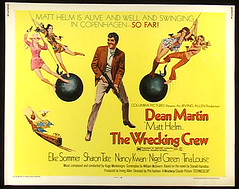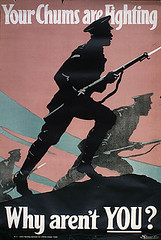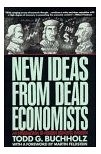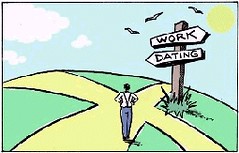She Needs Your Help
Heather, the popular marketing recruiter, is in a tizzy.
She has to find a name for her baseball team so she
is asking the universe for suggestions.
Me and Dino have a few.
Number one name: The Wrecking Crew!
Get it? Wreck as in RECruit. Crew as in reCRUIter.?
Backups: The Recrewcuts, The Recuties, The Crewballs,
The 925ers and The Stafflocaucus.
I also have a name for the janitorial team: The Drecking Crew.
If you want to help, you can find her here.
Visibility - Again.
There was an article in the Globe and Mail today about a new trend called "bearhugging" in which:
organizations and leaders of teams identify the members of their teams who are critical to their success and acknowledge their value with perks such as stock plans, promotions, special projects and training.
Supposedly this is a good way to keep people. I don't know why this should be news - it seems like common sense that you should try to find wasy to hang on to your best talent. Even your average talent is worth hanging onto since they know the company better than an average performer from outside.
What caught my eye was a bit at the end that listed some ways that you can leverage your career by increasing your visibility. Here are some of them:
Stay aware of changes in your profession. Executives can expect to move through six or more jobs on their way to the top.
Make sure you are active in your professional organization.
Raise your visibility outside your own organization both professionally and in the community.
Get published or be interviewed in professional journals.
Do public speaking at industry functions.
Make sure you are known by recruiters.
This all sounds very familiar to me and if you have been a long time reader to our blog it will be to you too because I did two posts on the subject last year. They were called What Kind of Candidate are You Part II - Visibile or Invisible? and Increasing Your Visibility II
Here's some of my advice from those posts
"... firstly start attending conferences and seminars. Sometimes attendees lists are found on the Internet by enterprising recruiters and we are typically more interested in the attendees than the high flying speakers.
Secondly and most important: to what professional associations do you belong? No matter what field you are in there is some type of professional association (sometimes several). Just joining one gets you on the membership directory and headhunters love membership directories!!
But don't just stop at joining an association - get involved. Get on committees help out in events. If you are on the association executive or a committee you will probably be listed on a the website and thus you will be more visible!"
I think maybe the Globe secretly reads our blog. I have some more to say on this subject but in the interest of brevity I will leave it for another post next week.
In case I forget though remind me to write about how the new privacy laws are killing your career.
Trust me it is that serious.
Hurdy Gurdy Man
The resounding question that seemed to be on everyone’s mind yesterday was: “Who is Mark Hurd”? Well for those who were following the search by HP to replace Carly Fiorina it was.That’s because Mr. Hurd came out of nowhere to take the top job. He wasn’t even on the radar screen for most people (including us).
Hurd was most recently CEO of NCR (where he has worked for 25 years) a 6 billion dollar operation compared to HP’s 80 billion.
That’s some jump but a lot of people are saying he is the right man for the job.
Motley Fool gushed:
It's a brilliant move for HP, giving the company the freshest breath of optimism that it has been able to inhale in years
and others chimed in:
"This is the right guy at the right time," said Mark Stahlman, an analyst with Caris & Co. "He is a high tech guy and a high growth guy who is very operations oriented."
Patricia Dunn said that Hurd was the board's top choice and indicated that NCR's revival was one of the key factors behind their decision to hire him.
"Mark came to our attention because of his strong execution skills, his proven ability to lead top performing teams and his track record in driving shareholder value. He demonstrated these skills by turning around NCR, which, while smaller than HP, is a complex organization with multiple business segments," she said.
One fund manager who owns shares of NCR said that Hurd is one of the best executives he's ever met.
What makes him so good? Well apart from being very personable with staff and not given to the “rock star CEO” mentality he is apparently very operations oriented and according to one person “he executes like mad”.
Don’t worry though that doesn’t mean he cuts peoples heads off with great passion.
Not everyone is 100% sure that Hurd is the right person for the job however.
Barry Randall, manager of the First American Technology fund, which owns NCR but not HP, thinks the euphoria about a new HP CEO could soon fade. He said many investors had been buying HP because they believed the sum of the parts argument, i.e. that it would be worth more in pieces.
Randall thinks once investors realize that a break up is no more likely under Hurd than it was under Fiorina, shares could fall. "The punch line to me is that shares of HP jumped when Carly got the boot because they felt she was a roadblock to splitting the company up. And now they've hired a guy who clearly will not split the company up," he said.
"NCR has fallen so far off the radar. They have essentially been level, at best, for over a decade" in the general-purpose server market," said Jonathan Eunice, an analyst at Illuminata. HP instead should have tried to recruit one of the many lifers out of IBM, Eunice said.
Calls made to headhunters and other executives brought intense skepticism that Hurd -- or any young CEO -- could make the jump from a $6 billion company to an $80 billion tech giant with thousands of different product lines. "Mark is a very decent guy, but I can't believe he would be remotely qualified," says one headhunter.
As I see it Hurd’s biggest problem might be the fact that some of those who run the different divisions might not feel they can learn anything from him. After all some of them have been responsible for businesses that are larger than NCR itself.
Hurd will have to establish credibility with these execs quickly or he will face real problems. He may even have to move some people out.
Although you can bet that some are dusting their resumes off already.
He will also have to demonstrate his affinity for technology. Although it didn’t help his cause when he avoided questions from reporters at a press conference by pretending to take a call on his imaginary cell phone.
BTW now that NCR has an opening maybe Canadian Headhunter will get the call?
Carly Fiorina Fired! Replaced by Mark Hurd
The news is here. Anthony will bring you pictorial comments soon.
Hat Tip Peter Dawson
The news is here. Anthony will bring you pictorial comments soon.
Hat Tip Peter Dawson
Anti-Woman Bias Infects Liberal Bosses
From: Raise Your Hand If You're A Woman in Science,
Virginia Valian, Washington Post, January 30, 2005 (edited)
Researchers asked people to rate men and women
VPs in an aircraft company as to:
a) competence
b) likeability
The raters were told that:
a) half the VP's were great performers.
b) the other half had not had a performance
review yet so their competence was unknown.
MEN MORE COMPETENT
When the raters received no information about a person's performance they rated the man as more competent than the woman, and rated them as equally likeable.
When told that the person was very competent, they rated men and women as equally competent.
SUCCESSFUL WOMEN LESS LIKEABLE
But both men and women raters saw the successful women as less likeable than the men.
There's a lot of research like this but it is not well-known so it has not had much effect.
Genius blogger, Businesspundit, offers a different explanation
as to why research on bias has no effect.
The results of the research on bias are well-known.
But everyone assumes that it pertains to someone else.
Inotherwords, research on bias is beaten by
the very bias it researches.
From: Raise Your Hand If You're A Woman in Science,
Virginia Valian, Washington Post, January 30, 2005 (edited)
Researchers asked people to rate men and women
VPs in an aircraft company as to:
a) competence
b) likeability
The raters were told that:
a) half the VP's were great performers.
b) the other half had not had a performance
review yet so their competence was unknown.
MEN MORE COMPETENT
When the raters received no information about a person's performance they rated the man as more competent than the woman, and rated them as equally likeable.
When told that the person was very competent, they rated men and women as equally competent.
SUCCESSFUL WOMEN LESS LIKEABLE
But both men and women raters saw the successful women as less likeable than the men.
There's a lot of research like this but it is not well-known so it has not had much effect.
Genius blogger, Businesspundit, offers a different explanation
as to why research on bias has no effect.
The results of the research on bias are well-known.
But everyone assumes that it pertains to someone else.
Inotherwords, research on bias is beaten by
the very bias it researches.
Hiring Biased Against Short Men & Women
M. Gladwell, author of Blink, believes your decision-making skills can be easily "hijacked" without you knowing it.
Here's some evidence.
1. The percentage of women in professional orchestras rose from 5% to 50% after musicians unions forced them to put up screens to make auditions anonymous.
When evaluators didn't know the sex of the performers,
they found that women were among best.
2. Less than 4% of the general population is over 6 feet tall - but a majority of CEOs are. Gladwell suspects that there is a bias (perhaps innate) to see height as a proper attribute of power.
(Doesn't this suggest that short men, like Napoleon and Lenin, who are shut out by this bias, will be more inclined than others to lead opposition movements? And who would follow them except other short men? I see a doctoral thesis here: "The Short Man's Army: Height Disadvantage and Revolution".)
GROUPS ARE STUPID
Gladwell also believes that groups are more likely to make stupid decisions. Because when other people agree with your hasty, incorrect judgements, you are more inclined to think them valid.
(The next time someone tells you to get a "reality check" by seeing if other people agree with you -- well, now you can tell them to buzz off.)
via Liz of Corante Tech News. Previously posted on Recruiting.com
M. Gladwell, author of Blink, believes your decision-making skills can be easily "hijacked" without you knowing it.
Here's some evidence.
1. The percentage of women in professional orchestras rose from 5% to 50% after musicians unions forced them to put up screens to make auditions anonymous.
When evaluators didn't know the sex of the performers,
they found that women were among best.
2. Less than 4% of the general population is over 6 feet tall - but a majority of CEOs are. Gladwell suspects that there is a bias (perhaps innate) to see height as a proper attribute of power.
(Doesn't this suggest that short men, like Napoleon and Lenin, who are shut out by this bias, will be more inclined than others to lead opposition movements? And who would follow them except other short men? I see a doctoral thesis here: "The Short Man's Army: Height Disadvantage and Revolution".)
GROUPS ARE STUPID
Gladwell also believes that groups are more likely to make stupid decisions. Because when other people agree with your hasty, incorrect judgements, you are more inclined to think them valid.
(The next time someone tells you to get a "reality check" by seeing if other people agree with you -- well, now you can tell them to buzz off.)
via Liz of Corante Tech News. Previously posted on Recruiting.com
Canadian Headhunter: Model for Excellence?
It looks like a class at the Management School of Lyon in France is using Canadian Headhunter as a model for its own blogs.The link isn't public but if you could follow it you'd see us listed there along with a number of student blogs.
Right under our name it says "C'est un blog tres fou."
That must mean we're pretty good, eh?
I think the course is about the impact of IT on Human Resource
management in the Swiss Cheese industry.
The prof is a blog-savvy American named Lee Schlenker.
His resume is ici.
Bon chance mes amis.
Layer-Cake Design Is Loathsome
Space-Guzzling Addresses Out!
90% Of Resumes Are Structurally Unsound
I've seen a few versions of this story.
An outsider asks the student of a guru why he studies with his teacher. The student replies. "I came here to see how he ties his shoes."
But not the way he writes his resume.
Because when it comes to resumes, even smart guys
have not experienced enlightenment.
In fact, according to the Canadian Resume Society 90% of all
smart people don't know how to write their addresses properly.
Here's what they mean.
Do you remember the definition of a resume?
A small space in which you have to write your life story.
Small space, long story. No room for space-guzzlers, obviously.
So, why use the layer-cake address (LCA) structure?
I mean, why this:
Joan Jones
10 Castlview Court, Suite 1704,
Toronto, Ontario, M5P 2G8
Home: 416 XXX XXXX
Work: 416 XXX XXXX
Email: rex_rule@hotmail.com
When you could have this:
Joan Jones
10 Castlview Court, Suite 1704, Toronto, Ontario, M5P 2G8
Home: 416 xxx xxxx; Work: 416 xxx xxxx; Email: rex@hotmail.com
Meditate on that and I'm sure you'll see that with just a little common sense even you can find your resume on two well-designed pages. Or, maybe even one.
Space-Guzzling Addresses Out!
90% Of Resumes Are Structurally Unsound
I've seen a few versions of this story.
An outsider asks the student of a guru why he studies with his teacher. The student replies. "I came here to see how he ties his shoes."
But not the way he writes his resume.
Because when it comes to resumes, even smart guys
have not experienced enlightenment.
In fact, according to the Canadian Resume Society 90% of all
smart people don't know how to write their addresses properly.
Here's what they mean.
Do you remember the definition of a resume?
A small space in which you have to write your life story.
Small space, long story. No room for space-guzzlers, obviously.
So, why use the layer-cake address (LCA) structure?
I mean, why this:
Joan Jones
10 Castlview Court, Suite 1704,
Toronto, Ontario, M5P 2G8
Home: 416 XXX XXXX
Work: 416 XXX XXXX
Email: rex_rule@hotmail.com
When you could have this:
Joan Jones
10 Castlview Court, Suite 1704, Toronto, Ontario, M5P 2G8
Home: 416 xxx xxxx; Work: 416 xxx xxxx; Email: rex@hotmail.com
Meditate on that and I'm sure you'll see that with just a little common sense even you can find your resume on two well-designed pages. Or, maybe even one.
Take this job and.....
How's this for life as a recruiter:Searing back pains, nervous breakdowns, high turnover, suicide.
Gee is life that tough for us in the executive search business? Well not quite. We do have the stress and turnover but the US Army recruiters are really having it tough right now.
Why?
People are less likely to sign up now that there is an acutal war going on. Recruiters are facing hostility on campuses and their quotas have been increased.
The Army is seeking 101,200 new active-duty Army and Reserve soldiers this year alone to replenish the ranks in Iraq and Afghanistan, elsewhere around the world and at home.
That means each of the Army's 7,500 recruiters faces the grind of an unyielding human math, a quota of two new recruits a month, at a time of extended war without a draft.
For the first time in nearly five years, the Army missed its active-duty recruiting goal in February.
The Reserve has missed its monthly quota since October. Army officials said the goals would most likely be missed the next two months as well.
Of course part of the problem could be that the army isn't selecting good recruiters properly:
Some soldiers are better suited to the task than others. Staff Sgt. Jose E. Zayas, 42, is outgoing, bilingual and embraces his mission. Recently, canvassing in the Bronx, he had little trouble persuading a couple from Massachusetts to accept a few pamphlets.
But for every Sergeant Zayas, there is a recruiter like Sgt. Joshua Harris, 29, a former personnel administrator in a New Jersey recruiting station, who struggles when talking to strangers. Seven weeks of instruction in approaching prospects helped him, he said. But many recruiters said few soldiers possess the skills they need.
See there's the problem. Recruiting is at its essence selling. If you don't have even a modicum of selling skills you will not be successful. Being a recruiter of any sort means you have to be willing to talk to strangers and to talk to lots of them before you make a "sale".
But there's more:
Recruiters are paid about $30,000 a year, plus housing and other allowances, including $450 a month in special-duty pay for recruiting. They live where they recruit, often hundreds of miles from a base.
Anyone see a problem here?
Low paying job combined with people who aren't suited for it. That spells trouble. The Army and any company faced with turnover and recruitment issues has to face reality: if you are having retention problems you have something that needs fixing internally. If you are having recruiting problems you are not selling your company well.
Many clients I deal with have trouble recruiting people and yet refuse to accept the fact that their company has a poor image in the market place. Even if the public image is incorrect you have to take that into account when you are recruiting.
You have to be willing to sell to the negative and not avoid it.
Example: The Army used to recruit on things like travel and college education. Things have changed now and they are fighting a war. Used to be young men actually volunteered BECAUSE they wanted to fight not because they wanted a diploma.
Ya' think you might want to try to focus on finding those types?
And perhaps you need to be bringing in some real headhunters to help train and coach you recruiters.
Oh and a little pay raise or linking comp to performance wouldn't hurt either.
It's not rocket science guys.
Source: New York Times (sub required but it's free so sign up already).
Non-Confrontational Argument
Carlo Rogers was a psychotherapist.He couldn't change his clients' dopey ideas by rational argument.
When he tried to prove them wrong, they just became defensive.
So he simply avoided argument --
and the statement of any point of view.
Instead, he merely restated the client's ideas.
He was more than a stenographer in that he tried
to articulate the feelings in their words.
But he did not draw conclusions that went far beyond what was actually said. Because, then the client would resist.
Rogers' approach has been used to help communication
in any emotional situation, including tough negotiations.
A Rogerian Argument has 4 elements.
1. State the opposing view before your own
-- without overt or hidden evaluations.
2. Don't just articulate ideas.
Imagine the context that makes them seem valid.
3. State your own view
including the circumstances and feelings that make it seem valid.
4. Don't show how your opponent is wrong.
Show how his position would benefit by
adopting elements of your position.
Don't Highlight Errors
When you feed back the other person's views, don't
highlight their lack of logic. That's confrontational.
(eg. "So, you want us to pay you more than we can afford.")
Don't Debate, Cooperate
Rogers intended his method to assist in the
cooperative exploration of a problem issue.
In fact, he said that using his technique to win an argument
or change another's mind is a perversion of his thinking.
He was trying to be solution-oriented
but not in the least combative.
So, the restating process, for instance, is not
meant to simply soften up your opponent.
It's supposed to put you in touch with the
complexities of his point of view.
Feminists Find It Gutless
Feminists complain, however, that the Rogerian approach is feminine rather than feminist because it is not assertive enough and too emotionally neutral (unemotional).
Can It Be Irritating?
Sometimes, when I call a company for information, it seems as if the people I speak to have been trained never to say anything oppositional.
I finally have to ask them "Does that mean No?".
To which they refuse to answer "Yes".
It's like interviewing a politician who's been trained to never acknowledge disagreement but merely to state and restate her policy no matter what question is asked.
They seem to have absorbed some of Rogers' technique but perverted it into a verbal judo that allows them to roll with the punches until the other guy gets tired and gives up.
And if you are a bit dull and don't recognize that their code words mean "no", their begrudged tone lets you know that you are pissing them off.
Actually, this might not be Rogerian at all, but it leads one to recognize a resemblance between Rogers and that style of etiquette which considers bringing something unpleasant into the open a matter of bad taste, assuming, rather, that with all decent people it will be simply understood.
Source: Doug Brent Rogerian Rhetoric. See also: Deborah Tannen, "The
Feminine Technique" (which was condensed into this posting.)
No News Is....
No word from HP yet on which candiate from our short list has been put forward by Russell Reynolds to succeed Carly Fiorina. This seems to be bugging some people:HP's interim management frustrated any shareholder attempts to find out how its CEO search is really going at its annual meeting Wednesday.
The company's non-executive chairman Patricia Dunn said she wouldn't answer any question about the search.
People had to be content with her assurance that "We are pleased with out progress and we are where we expected to be and want to be at this juncture."
Of course, BusinessWeek has claimed that the slot could be filled by the end of the month. Meanwhile, if Carly had her heart set on being the next head of the World Bank, a balloon that was floated two weeks ago, her hopes have been dashed. The White House is putting up Deputy Defense Secretary Paul Wolfowitz.
Senior level searches, and especially ones of this magnitude, tend to take a fairly long time. Part of the problem is that CEO level candidates tend to travel quite a bit and the process of even meeting them for an interview becomes quite time consuming.
But why certain shareholders feel they should be kept abreast of the search is beyond me. One of the complicating factors of any search is confidentiality. Candidates are employed with other firms and don’t want their intentions bandied about at shareholder meetings.
This search is a critical one for HP, it is not one to be taken lightly. Even if the search wasn’t going well should Patricia Dunn have said “OMG we are so screwed we don’t know what to do we have NO candidates!!!!”
 Of course that would be a lie since we have already done half the search for Russell Reynolds when we outlined a short list some time ago.
Of course that would be a lie since we have already done half the search for Russell Reynolds when we outlined a short list some time ago. Holders of HP stock should relax. If Russell Reynolds doesn’t get the job done Canadian Headhunter will be there for the easy slam-dunk.
Now as for finding Carly a job……
New Postings on I Hate Recruiters
This is the link. And, don't forget to send us your horror stories. Here.
This is the link. And, don't forget to send us your horror stories. Here.
Traditional Job Culture Alienates Women
Natural Born FightersAccording to Professor Deborah Tannen, women aren't sissies.
They just don't like fighting.
And, men do.
As boys, they love play-fights. They show affection
by mock-punching or playfully trading insults.
And, as men, they explore ideas by playing
devil's advocate and challenging eachother.
Western Civ is Boyish
Tannen claims that girls fight when they have to, but not for fun.
And, they love science and political journalism.
But they don't like confrontational debater's style of exploring ideas favoured by our culture. So they don't pursue careers in these fields.
Tannen notes, however, that women who do not drop out find
that a non-combative approach can also bring success.
For instance, female lawyers who don't force themselves to be aggressive but take a quiet, sympathetic approach to witnesses get the information they need.
They are willing to be critical and offend when necessary,
but not as a matter of principle.
Eastern Civ is Feminine
Not all men like being attacked in debate either.
They find it discouraging rather than bracing.
In fact, says Tannen, Chinese and Japanese intellectual cultures are not adversarial. They try to relate ideas to eachother rather than match them with contradictions.
Tannen points out that Japanese talk shows rarely feature only two guests and suggests that this is a reflection of their desire to avoid the point-counterpoint style. (Steve Kempton disagrees. See his remarks on this in our comments section.)
Source Deborah Tannen, LA Times
Update: NYT columnist, Maureen Dowd wrote recently that men 'enjoy verbal duelling,' and that as a woman, she has wanted 'to be liked — not attacked'. In reply, Antonia Zerbisias says, please, "...there's no shortage of women out there with opinions." Dowd's view is also undermined by the attack that started the journalistic controversy: Susan Estrich suggested that Michael Kinsley was publishing few women because his Parkinsons disease was impairing his judgement.
(See posting on Non-Confrontational Argument.
Also, check out Amy, Lauren and Martha at Snarkywood)
The Future Of Newspapers
An article on the relationship of blogs to newspapers by Antonia Zerbisias was an eye-opener for me.She says that young people will spend lots of
money on technology, like cellphones,
but they won't pay for content.
And this puts newspapers that charge for content in trouble.
Because bloggers won't link to papers that require subscriptions. And the fewer links a paper gets, the less hits it gets on Google.
Her conclusion:
- That's why it's not only good to give away the content; it's also wise to have blogs...
For example, every day, I gather a lot more information than I can possibly fit into this space.
Why not amortize that work over more platforms, and use it to drive traffic to our website and generate more advertising?
We're #4.... Right??
Korn/Ferry said Monday it has regained its position as the No. 1 executive search firm in the United States and the world, according to recently released rankings from two trade organizations.Korn/Ferry, which ranked third in the United States and second internationally a year ago, edged out Chicago-based Heidrick & Struggles International Inc. (NASDAQ:HSII), which took the top spot globally last year, and Chicago-based Spencer Stuart, which was No. 1 in the United States last year.
Congrats to Korn Ferry. But that is not all. Apparently the search business is booming:
A broad and sustained increase in executive recruiting activity in the United States and worldwide helped retained executive search consulting firms snap a three-year slump and fueled double-digit increases in professional fee revenue for the largest of them in 2004.
The 20 largest global retained executive search consulting practices posted a 25% gain in professional fee revenue in 2004, while the 40 largest retained executive search firms in the United States registered a 21% gain in revenue, according to the just-released annual search firm rankings issue of Executive Recruiter News (ERN), whose publisher, Kennedy Information, Inc., has tracked the global business of executive search since 1970.
"Corporate management is shifting its focus from cost-containment to business growth, and it's investing in executive talent to seize new opportunities, differentiate from the competition, and build and align workforces to meet the demands of the global economy," says Joseph Daniel McCool, editor in chief of Executive Recruiter News. "The broad and sustained increase in executive recruiting activity we witnessed in 2004 signals that employers around the world are beginning to rebuild the people side of their businesses, and that should bolster the jobs market at all levels in 2005."
I Hate Recruiters Too!
Dear Readers, I am announcing the creation of yet another blog.It's called I Hate Recruiters and it's full of postings from my family and friends.
OK, it isn't. It's not about me. It's about a much graver issue:
job hunting gone bad.
I'm going to start it off with postings I've found on other blogs.
But in order to continue, I'll need stories from you,
the job-hopping public.
So, think about sending us a note about your experience.
And, in the meantime, you can find the first entries here.
Contemp Culture Stinks of Finks
Publishing legend, Tina Brown is full of surprises as she rebels against a straight-laced age.From Tina Brown, Washington Post:
- Sex at the office used to be one of the things that made going to work worthwhile...
We are in the Eggshell Era, in which everyone has to tiptoe around because there's a world of busybodies out there who are being paid to catch you out -- and a public that is slowly being trained to accept a culture of finks.
We're always under surveillance...paparazzi make small fortunes snapping glamour goddesses picking their noses....
No matter who you are, someone is ready and willing to rat you out. Even the rats themselves have to look over their shoulders... [and] Bloggers are the new Stasi.
via Damian Penny. (I don't think Dame got the humour in this one. At least, I think it's supposed to be outrageous. (And for the sake of her husband, I hope so!)
Job Sob Give and Take
I liked this question and answer session about career problems.Q: I was an event planner but I got severe psoriasis and they let me go.
A: Become an event planner for a skin disease society.
They'll be more sympathetic.
Q: My job as help-desk manager was shipped to New Zealand.
What should I do?
A: Get the same job in a government agency.
They won't offshore.
Read the rest.
Searching for Jeremy Wright
Some of you might have heard via the blogosphere that Jeremy over at Ensight had an adventure of sorts when he tried to cross the border from Canada to the US recently. Jeremy had landed a Blogging related job in New York and was off to start his job.
However he was stopped at the border and after a rather long ordeal not allowed to enter the US. Jeremy has removed some posts he did on the subject but his border adventure is not what interested me.
Mike had a cup of coffee with Jeremy today and he told him that he was approached by a consulting firm about this job. They were desperate. The client a large publishing company had been looking for someone to help them start a blog (or something like that) and wanted someone with blogging expertise (both content and technical). Not only that but this was the second firm they had tried another “consulting firm” had come up empty.
Now I don’t know if these consulting firms were actual recruiters or some other type of consultants but I am flabbergasted that someone would find it difficult to find someone to fill this position.
Remember there are about a billion bloggers (well not that much but close) out there and the technical blogs were the originators of the phenom in many respects.
Could it be that these people knew absolutely nothing about blogging??
But even if that was the case that shouldn’t have stopped them from finding someone qualified in a short period of time.
Incidentally I am not saying Jeremy is not qualified. I just think that the search should have been very easy.
If I were given this search and knew nothing about blogs the first thing I would do is learn about blogs.
I would hope that if these people are not Internet savvy then they would have at least noticed that Time and Fortune have both done cover stories about blogs and blogging recently?? Heck every local newspaper in every town has had some form of article about blogs in the past year.
Just Tuesday while driving to a meeting in Toronto I heard a local talk radio station talking about the woman who was fired for writing something negative about her employer on her own blog.
It’s not like these things are unknown at this point (although lots of people still don’t have a clue about them).
The first thing I would do is a Google search on blogs. Let me clarify I would first do a Google News search on them.
Why? If I don’t know squat about an industry I would like to see if there are any articles written that would give me a quick overview of the field.
I type in “blogging” into the Google News engine and come up with tons of hits. On the first page I find an article about “making money from blogging” this peaks my interest because it sounds like it might contain information about the people who are involved in blogging for a living – those are people I would like to target as candidates or referrals.
The link takes me to a blog called “Inside the Beltway” assuming I am new to blogging this person is my first potential target. So I click on the “about” link and find not one but 6 people listed. This is a jackpot for a recruiter. In one click I have found 6 names including the editor James Joyner.
Going back to the main page I read the article and discover that it is linking to another site with an interview done by a blogger with a guy from a company called “Blogads” that does advertising on blogs.
Pretty soon I have two more names:
John Hawkins who runs a blog called Right Wing News
And Henry Copeland from Blogads – the advertising company.
Now I want to check out Blogads. There is a link to the company provided. I click through. Ok Blogads at first doesn’t seem to have much but then I notice something on the right hand of the screen: testimonials!!
For example :
"Blogads makes it a snap to create and customize our campaigns, and the traffic they send to our book and author sites is significant. But the best part is being able to share space (mind-space, virtual-space, screen-space) with the bloggers who -- if they embrace our books and authors -- make all the difference."
- Farah Miller
Manager of New Media
The Knopf Publishing Group
WOW! The name of the manager of New Media for a Publishing group! Ya think she might be able to provide some referrals? Maybe she would be a candidate herself??
There are also 7 more names on the testimonials all from Bloggers.
From Google link I already have 16 names and I am just getting warmed up. I go back to Google News and after a couple of false starts with articles buried under subscription walls I find another article of interest. This one seems to be about by a journalist talking about blogs as some form of new media (remember I am trying to conduct this as if I don’t know anything about blogs).
He mentions some guy. A pioneer named Matt Drudge I make a note of it.
More importantly he mentions a company called “blogger” which apparently allows people to set up their own blogs. I check it out. Apparently it was founded by three people in San Francisco and they sold it to Google (lucky bastards). A link in their about section takes me to an article about the purchase. It gives the name of Evan Williams as one of the founders of blogger with a link to his sight which provides me with his email.
Additionally it mentions two other Blogging companies: Movable Type and Userland Radio
I am up to 18 names. Plust the names of some of the key companies who are playing in the blog space I have been barely searching for a half hour.
I could go on but you get my drift.
My next step would be to continue to build that list. Then when I had about 100 or so names I would begin contacting these people via email (since they all seem so willing to put their emails on their sites) and telling them about the search. I would ask them if they were interested and if not could they recommend someone.
Now let me ask you this. Do you think that I would generate some interest? Do you think that maybe this would start to percolate through the blogosphere and eventually turn up even more people that I never heard of.
I don’t know. Maybe the people who were conducting the search did this. The second company managed to find Jeremy. But they were desperate at this point.
Maybe this company in question should have hired real recruiters.
Why Men Earn More
Wendy McElroy reviewed Warren Farrell's Why Men Earn More.This is an abbreviated version.
No Discrimination
On average, women earn 80 cents for every dollar paid to men.
This isn't due to discrimination
against women.
Women Earn More
Farrell compared starting salaries for women and men with Bachelor's Degrees in 26 categories of employment.
When women compete directly with men, they are paid equally in one category; in every other category, they earn more.
Women Work Less
However, women often prefer jobs with shorter and more flexible hours to accommodate the demands of family.
The US Bureau of Labor Statistics say men work 45 hours a week and women only 42.
Men are more than twice as likely as women to work at least 50 hours a week.
Women Avoid Hardship Posts
And, women favor jobs that involve little danger, no travel and good social skills. And, these jobs pay less.
Men represent 92 %of all occupational deaths.
Because the most hazardous occupations -- fire fighting, truck driving, construction, and mining -- have 96-98 % male employees.
A Strategy For Women
Women can take dangerous jobs but will not be put into danger for two reasons.
a) Male protectiveness
b) Fear of legal repercussions
10% of the soldiers deployed in Iraq are women. Yet women are 2.6% of soldiers killed. Because a woman is more likely to choose and be chosen for the safer jobs.
And, private industry favours the safety of women over men out of fear of lawsuits for harms such as exposure to chemicals or other stress during pregnancy.
Source article.
The War for Character
Hey are you still fighting the "War For Talent"? Dude that is soooo 1990's. At least according to Heidrick and Struggles.
"In the thriving '90s," he says, "we corporate recruiters engaged in what management consultants at McKinsey called 'The War for Talent,' but in the wake of Enron and the era of corporate greed, we now have a 'War for Character.'"
The "he" quoted above is Les Csorba a partner in the firm.
He continues:
Talent has become overrated, Csorba says, as so many companies have learned to their misfortune when talent wasn't accompanied by depth of character. Genuine integrity and compassion are the new watchwords. Machiavellian pragmatism and results-at-any-cost are out.
Well then...... Hurrah!!!
I feel a little badly for all the untalented yet ethical people that I neglected to present to clients over the years. I mean if talent is overrated....
Seriously how do you interview for ethics? Do you flat out ask the guy - hey have you ever cheated? Have you ever cooked the books?
I have interviewed people before where ethics were an issue. One client of mine was very sensitive about the ethics of its sales force so they wanted to make sure that no one was hired who might be more interested in closing deals than doing ethical business.
There is nothing wrong with this as theory. In practice however it is not always so clear cut. Most sales people (and all successful senior executives are sales people) are adept at selling themselves and even those who might have committed transgressions (major or minor) are often convinced they did nothing wrong. Or they are able to convince themselves that it wasn't wrong.
So by what scale are we judging ethics? Certainly the recent conviction of Bernie Ebbers of Worldcom qualifies as an ethical violation, of that very few would argue. However what about recently fired Boeing CEO Harry Stonecipher? Would he pass the "ethics" test at Heidrick Struggles??
Maybe not, however plenty of companies would be happy to have a CEO who could create the type of results that Stonecipher did during his tenure. Hey some of them might not admit it but you and I know there are some boards out there that are thinking "look as long as he isn't committing accouting fraud we don't care who he is boinking".
I once did a search for a senior tax professional for a large consulting firm. Whilst checking references one of the people I spoke to ( a former boss ) said that this person wasn't a great fit because of his "risk profile". I took this as a code for "he wasn't willing push the envelope" certainly this was an ethics issue that placed the candidate in a positive light and in the end it helped him get the job.
But do we need to have such an emphasis on "ethics" from executive search firms? I don't want to speak ill of my betters - and lets face it Heidrick Struggles wouldn't hire me on a bet. But this sounds like a quick marketing ploy to capitalize on the sudden bout of morality afflicting publicly traded companies.
At the end of the day however there are already strict ethical controls in place. They are called laws. And since the Enron/Worldcom/ fiascoes the laws have been tightened (via Sarbanes Oxely) to make CEO's criminally liable for accounting frauds that occur on their watch whether they were directly involved or not.
So now most CEO's are in a state of paranoia about this. The huge demand for qualified internal auditors is a pretty fair indication that publicly traded companies are taking this very very seriously.
Even executives that might have been willing to play very close to line before are now well aware that they wont be given a fat bonus and a slap on the wrist for this type of behavior anymore.
So how would you determine if your candidates live up to whatever ethical standards your client is demanding? Only two solutions come to mind. The first is references however this area is fraught with some peril. If someone is willing to say on a reference that person A is unethical they might open themselves up to lawsuits. And if you are looking for a past track record that might not be an indication of future behavior. I don't think the Enron and Worldcom boys would have shown a record of fraud in their previous companies. At least no one is coming forward that I am aware of to say "hey these guys have been doing this all their lives". So references might or might not provide the information that you seek.
The other option you have is psychological testing. Psychological testing wont tell you definitively that someone is going to break the law. However they can in some cases point to a personality type that MIGHT be more disposed to shady behavior. However these aren't iron clad.
I do not believe that this type of personality can be evaluated in an interview. But a good interview combined with references and personality profiling might give you a better than average chance of doing so.
But it does beg the question. Why weren't search firms doing this all along?? At any rate I predict a return to a “War for Talent” in the not to distant future. How soon? Well when shareholders start making it clear that as long as the law is being obeyed they aren't interested in hiring CEO's whose only redeeming quality is being able to do a good Jimmy Carter impression.
Read more here including a list of questions that any good sociopath will knock out of park.
Hey are you still fighting the "War For Talent"? Dude that is soooo 1990's. At least according to Heidrick and Struggles.
"In the thriving '90s," he says, "we corporate recruiters engaged in what management consultants at McKinsey called 'The War for Talent,' but in the wake of Enron and the era of corporate greed, we now have a 'War for Character.'"
The "he" quoted above is Les Csorba a partner in the firm.
He continues:
Talent has become overrated, Csorba says, as so many companies have learned to their misfortune when talent wasn't accompanied by depth of character. Genuine integrity and compassion are the new watchwords. Machiavellian pragmatism and results-at-any-cost are out.
Well then...... Hurrah!!!
I feel a little badly for all the untalented yet ethical people that I neglected to present to clients over the years. I mean if talent is overrated....
Seriously how do you interview for ethics? Do you flat out ask the guy - hey have you ever cheated? Have you ever cooked the books?
I have interviewed people before where ethics were an issue. One client of mine was very sensitive about the ethics of its sales force so they wanted to make sure that no one was hired who might be more interested in closing deals than doing ethical business.
There is nothing wrong with this as theory. In practice however it is not always so clear cut. Most sales people (and all successful senior executives are sales people) are adept at selling themselves and even those who might have committed transgressions (major or minor) are often convinced they did nothing wrong. Or they are able to convince themselves that it wasn't wrong.
So by what scale are we judging ethics? Certainly the recent conviction of Bernie Ebbers of Worldcom qualifies as an ethical violation, of that very few would argue. However what about recently fired Boeing CEO Harry Stonecipher? Would he pass the "ethics" test at Heidrick Struggles??
Maybe not, however plenty of companies would be happy to have a CEO who could create the type of results that Stonecipher did during his tenure. Hey some of them might not admit it but you and I know there are some boards out there that are thinking "look as long as he isn't committing accouting fraud we don't care who he is boinking".
I once did a search for a senior tax professional for a large consulting firm. Whilst checking references one of the people I spoke to ( a former boss ) said that this person wasn't a great fit because of his "risk profile". I took this as a code for "he wasn't willing push the envelope" certainly this was an ethics issue that placed the candidate in a positive light and in the end it helped him get the job.
But do we need to have such an emphasis on "ethics" from executive search firms? I don't want to speak ill of my betters - and lets face it Heidrick Struggles wouldn't hire me on a bet. But this sounds like a quick marketing ploy to capitalize on the sudden bout of morality afflicting publicly traded companies.
At the end of the day however there are already strict ethical controls in place. They are called laws. And since the Enron/Worldcom/ fiascoes the laws have been tightened (via Sarbanes Oxely) to make CEO's criminally liable for accounting frauds that occur on their watch whether they were directly involved or not.
So now most CEO's are in a state of paranoia about this. The huge demand for qualified internal auditors is a pretty fair indication that publicly traded companies are taking this very very seriously.
Even executives that might have been willing to play very close to line before are now well aware that they wont be given a fat bonus and a slap on the wrist for this type of behavior anymore.
So how would you determine if your candidates live up to whatever ethical standards your client is demanding? Only two solutions come to mind. The first is references however this area is fraught with some peril. If someone is willing to say on a reference that person A is unethical they might open themselves up to lawsuits. And if you are looking for a past track record that might not be an indication of future behavior. I don't think the Enron and Worldcom boys would have shown a record of fraud in their previous companies. At least no one is coming forward that I am aware of to say "hey these guys have been doing this all their lives". So references might or might not provide the information that you seek.
The other option you have is psychological testing. Psychological testing wont tell you definitively that someone is going to break the law. However they can in some cases point to a personality type that MIGHT be more disposed to shady behavior. However these aren't iron clad.
I do not believe that this type of personality can be evaluated in an interview. But a good interview combined with references and personality profiling might give you a better than average chance of doing so.
But it does beg the question. Why weren't search firms doing this all along?? At any rate I predict a return to a “War for Talent” in the not to distant future. How soon? Well when shareholders start making it clear that as long as the law is being obeyed they aren't interested in hiring CEO's whose only redeeming quality is being able to do a good Jimmy Carter impression.
Read more here including a list of questions that any good sociopath will knock out of park.
The Dirty Old Male Mail
New revelations have come forth over the firing of Boeing CEO Harry Stonecipher.
You remember him? He was fired over an affair with another executive but according to the company he wasn't fired because of the affair. Got that? Well most of us didn't but new details have emerged:
And yet, Boeing chairman Lew Platt was quoted in a corporate release saying the "facts" reflected badly on Stonecipher's judgment and would "impair his ability to lead the company." The facts meaning having an affair? No. In one interview, Platt made it clear that having an affair was not a violation of the company's code of conduct.
So, what's the deal? According to The Wall Street Journal, an informant tipped off Platt in a letter to which was allegedly attached a "very graphic" email written by Stonecipher to his lover. Suddenly, the sky clears. In this era of email inquisition, it is less what Stonecipher did, and more what he wrote. Brokers, investment bankers and accountants have all been shot dead in their corporate beds for either leaving a trail of incriminating emails or ordering the erasure of incriminating emails.
What could be worse for a company than having its leader's lurid, lascivious thoughts reported merrily throughout the media?
So there you have it. Shooting the messenger is starting to take on a whole new meeting.
Canadian Headhunter has yet to receive a call from Boeing asking for our help in filling the vacant position. But you if you want to read more about the current adventures of Harry Stonecipher and his not so secret chamber go here and don't forget our own local scandal involving Genuity has it's own twist on the email thing. You can read Mike's diligent coverage here.
New revelations have come forth over the firing of Boeing CEO Harry Stonecipher.
You remember him? He was fired over an affair with another executive but according to the company he wasn't fired because of the affair. Got that? Well most of us didn't but new details have emerged:
And yet, Boeing chairman Lew Platt was quoted in a corporate release saying the "facts" reflected badly on Stonecipher's judgment and would "impair his ability to lead the company." The facts meaning having an affair? No. In one interview, Platt made it clear that having an affair was not a violation of the company's code of conduct.
So, what's the deal? According to The Wall Street Journal, an informant tipped off Platt in a letter to which was allegedly attached a "very graphic" email written by Stonecipher to his lover. Suddenly, the sky clears. In this era of email inquisition, it is less what Stonecipher did, and more what he wrote. Brokers, investment bankers and accountants have all been shot dead in their corporate beds for either leaving a trail of incriminating emails or ordering the erasure of incriminating emails.
What could be worse for a company than having its leader's lurid, lascivious thoughts reported merrily throughout the media?
So there you have it. Shooting the messenger is starting to take on a whole new meeting.
Canadian Headhunter has yet to receive a call from Boeing asking for our help in filling the vacant position. But you if you want to read more about the current adventures of Harry Stonecipher and his not so secret chamber go here and don't forget our own local scandal involving Genuity has it's own twist on the email thing. You can read Mike's diligent coverage here.
Carnavale!
Carnival of the Capitalists, is up over at RFID Weblog (and you thought our blog was specialized)
Not only does it have links to all sorts of great business blogs but it also includes a link to a posting from Canadian Headhunter.
Yahoo!!!
Carnival of the Capitalists, is up over at RFID Weblog (and you thought our blog was specialized)
Not only does it have links to all sorts of great business blogs but it also includes a link to a posting from Canadian Headhunter.
Yahoo!!!
Leviathan
Business Pundit points us to a very interesting piece over at knowledge@wharton about the browser war between Microsoft (IE) and Mozilla (Firefox) .
I haven't used any of the rebel browsers and in fact I haven't even heard of the one that Business Pundit says he uses all the time. Something called Avant
However if you read the whole article at Wharton you can't help but feeling that the Firefox trend is just that: a trend.
Wharton marketing professor Peter Fader, for one, is skeptical of Firefox's success. To him, the big question is whether Firefox can maintain its market share when Microsoft updates Internet Explorer this summer. "Mozilla has passed some threshold, but it's not clear whether Firefox users are early adopters who are just delighted to have an alternative," he says, adding that "IE will get better. It's the usual dance. Microsoft will steal Mozilla's ideas and become competitive."
WebSideStory CEO Jeff Lunsford reports that usage of Firefox has slowed slightly since a big surge in November. "This is probably to be expected as we move beyond the early adopter segment," says Lunsford in an analysis accompanying WebSideStory's market share statistics. "Back in December 2004, it seemed Firefox was a lock to reach 10% by mid-2005, ahead of the reported year end goal of the Mozilla Foundation. Given the latest growth rates, the year end target still appears attainable, but a mid-year achievement is unlikely unless we see increased marketing activity from the Mozilla Foundation."
According to Fader, increased marketing of Firefox is unlikely. After all, Mozilla doesn't have the marketing budget to do a sustained campaign. Meanwhile, Microsoft has one asset that is almost unbeatable: Inertia. Microsoft's browser is packaged when you buy a PC. Other software such as Outlook and Office is included. Are people going to go out of their way to download a Firefox browser or some open source alternative to Microsoft products? "Sure you could argue that some of Microsoft's products are bloated and suboptimal, but they do get the job done reasonably well," says Fader.
The real test for Firefox and other open source alternatives will be how they gain share when Microsoft users are no longer annoyed by security. And what happens when Firefox itself becomes a target for hackers? Says Fader: "It's really a question of whether Firefox has just attracted dissatisfied Microsoft users or has gained a foothold so it can offer real competition."
Read the whole thing here.
Business Pundit points us to a very interesting piece over at knowledge@wharton about the browser war between Microsoft (IE) and Mozilla (Firefox) .
I haven't used any of the rebel browsers and in fact I haven't even heard of the one that Business Pundit says he uses all the time. Something called Avant
However if you read the whole article at Wharton you can't help but feeling that the Firefox trend is just that: a trend.
Wharton marketing professor Peter Fader, for one, is skeptical of Firefox's success. To him, the big question is whether Firefox can maintain its market share when Microsoft updates Internet Explorer this summer. "Mozilla has passed some threshold, but it's not clear whether Firefox users are early adopters who are just delighted to have an alternative," he says, adding that "IE will get better. It's the usual dance. Microsoft will steal Mozilla's ideas and become competitive."
WebSideStory CEO Jeff Lunsford reports that usage of Firefox has slowed slightly since a big surge in November. "This is probably to be expected as we move beyond the early adopter segment," says Lunsford in an analysis accompanying WebSideStory's market share statistics. "Back in December 2004, it seemed Firefox was a lock to reach 10% by mid-2005, ahead of the reported year end goal of the Mozilla Foundation. Given the latest growth rates, the year end target still appears attainable, but a mid-year achievement is unlikely unless we see increased marketing activity from the Mozilla Foundation."
According to Fader, increased marketing of Firefox is unlikely. After all, Mozilla doesn't have the marketing budget to do a sustained campaign. Meanwhile, Microsoft has one asset that is almost unbeatable: Inertia. Microsoft's browser is packaged when you buy a PC. Other software such as Outlook and Office is included. Are people going to go out of their way to download a Firefox browser or some open source alternative to Microsoft products? "Sure you could argue that some of Microsoft's products are bloated and suboptimal, but they do get the job done reasonably well," says Fader.
The real test for Firefox and other open source alternatives will be how they gain share when Microsoft users are no longer annoyed by security. And what happens when Firefox itself becomes a target for hackers? Says Fader: "It's really a question of whether Firefox has just attracted dissatisfied Microsoft users or has gained a foothold so it can offer real competition."
Read the whole thing here.
Your Career After You Die
It often seems that whenever a young criminal gets gunned down by police his family tells the newpapers that he wanted to be a doctor.
Of course, he'd dropped out of high school already but, in grief, that's beside the point.
I thought of this when I saw that
Bill Cameron had died.
He was a long-time news announcer on the government-sponsored Canadian Broadcasting Corporation (CBC). And he always seemed to be a very nice guy.
Anthony and I used to call him The Helmet. Because that was the nickname Frank Magazine gave him for the way he wore his hair.
The Strange Course of The Helmet's Career
The Helmet quit CBC suddenly, when his career seemed to be going well -- and then he promptly disappeared from public view.
Apparently, government cut-backs would have forced him to take a cut in pay.
Here's what he said when he quit the CBC.
A successful journalist says his work life is sillier than his personal life and goes to an online gem marketer.
Bill's Obituary
The Toronto Star published two obituaries.
But you won't find these issues explored there.
As you would expect, they are filled with praise, most of it, apparently, well-deserved (though a lot of it sounds hackneyed all the same).
However, a very good article by Mary Murtha describes the Helmet's career without pulling any punches.
And it seems to have had its fair share drama.
Here are some excerpts.
Read the rest of this posting here
(on Canadian Headhunter Long Play)
It often seems that whenever a young criminal gets gunned down by police his family tells the newpapers that he wanted to be a doctor.
Of course, he'd dropped out of high school already but, in grief, that's beside the point.
I thought of this when I saw that
Bill Cameron had died.
He was a long-time news announcer on the government-sponsored Canadian Broadcasting Corporation (CBC). And he always seemed to be a very nice guy.
Anthony and I used to call him The Helmet. Because that was the nickname Frank Magazine gave him for the way he wore his hair.
The Strange Course of The Helmet's Career
The Helmet quit CBC suddenly, when his career seemed to be going well -- and then he promptly disappeared from public view.
Apparently, government cut-backs would have forced him to take a cut in pay.
Here's what he said when he quit the CBC.
- Inevitably, you find that what you're doing for a major part of your day is extremely silly," he said. "I've got enough silliness in the rest of my life. I don't need it at work."
- Cameron...announced that he was taking a job as vice-president of communications at the Toronto-based American Gem Corp., a sapphire marketer, which then changed its name to Digital Gem Corp.
A successful journalist says his work life is sillier than his personal life and goes to an online gem marketer.
Bill's Obituary
The Toronto Star published two obituaries.
But you won't find these issues explored there.
As you would expect, they are filled with praise, most of it, apparently, well-deserved (though a lot of it sounds hackneyed all the same).
- He was one of the last of the classic journalists," said CBC senior executive documentary producer Mark Starowicz.
His death, "leaves a giant hole in Canadian journalism," he [Peter Mansbridge] said.
However, a very good article by Mary Murtha describes the Helmet's career without pulling any punches.
And it seems to have had its fair share drama.
Here are some excerpts.
Read the rest of this posting here
(on Canadian Headhunter Long Play)
How To Make Adobe Work Faster
Get Acrobat Reader to open up faster.Go to your Acrobat\Reader folder and take everything from the
"plug_ins" folder and move it into the "Optional" folder.
Except for the following: Search.api, Search5.api,
IA32.api, EWH32.api, EScript.api.
Printing and search will still work,
And it will load 75% faster. This is on Reader 6.0.
Source via Asim Jalis
Confronting Your Fears And Taking Control
Canadian Headhunter got mentioned. Halleluyah!
In an article about a brave woman who goes to a party to confront her enemies and finds them to be a bunch of wonderful guys.
It was very nice. But I have a complaint. (I mean, what am I blogging for if I can't complain?)
Antonia wrote:
Of course, even if you're subtle, you've got to watch who you're tangling with. Because The Relaxed Catholic don't take no guff.
And in her version of the evening Antonia lurches in slurring, "Where'sh all the guysh? Gimme a f**n beer!" (OK. That's my version of her version. You can read the real thing here.)
And then there's The Meatriarchy. He's a black belt, you know. And he shows it off in his rejoinder called "It's Official: I'm Mental". Gotta read that.
And, back to my complaint? Well, Damian might have been there looking for a little woman, but most of the people I spoke to were Married with Children.
And, by the way, ladies, if you want to live in Newfoundland, Damian's a good catch. He's no loser. And, he says that he was only joking about 51 being "old". (Though I must admit, he had me fooled).
You can find my take on the evening here.
(Now, everyone's saying it isn't true!).
Updates! The American Spy comes out swingin' here. The Small Dead Animal sticks a knife in your guts here. And The Staple Singer is more gentle, here.
And now The Ambler offers his ideas. (He seems to be taking on all of the women in the room.) And, oh yeah, apparently, some people think Tarantino is god.
Canadian Headhunter got mentioned. Halleluyah!
In an article about a brave woman who goes to a party to confront her enemies and finds them to be a bunch of wonderful guys.
It was very nice. But I have a complaint. (I mean, what am I blogging for if I can't complain?)
Antonia wrote:
- But, like so many of us in this lonely world, they [the bloggers] crave recognition. Many of the young men I met - for they were mostly men - truly deserve it.
Of course, even if you're subtle, you've got to watch who you're tangling with. Because The Relaxed Catholic don't take no guff.
And in her version of the evening Antonia lurches in slurring, "Where'sh all the guysh? Gimme a f**n beer!" (OK. That's my version of her version. You can read the real thing here.)
And then there's The Meatriarchy. He's a black belt, you know. And he shows it off in his rejoinder called "It's Official: I'm Mental". Gotta read that.
And, back to my complaint? Well, Damian might have been there looking for a little woman, but most of the people I spoke to were Married with Children.
And, by the way, ladies, if you want to live in Newfoundland, Damian's a good catch. He's no loser. And, he says that he was only joking about 51 being "old". (Though I must admit, he had me fooled).
You can find my take on the evening here.
(Now, everyone's saying it isn't true!).
Updates! The American Spy comes out swingin' here. The Small Dead Animal sticks a knife in your guts here. And The Staple Singer is more gentle, here.
And now The Ambler offers his ideas. (He seems to be taking on all of the women in the room.) And, oh yeah, apparently, some people think Tarantino is god.
Speed Reading
Fortune Magazine has published a list of 75 books of something called “The Smartest Books We Know” which is supposedly “a perfect reading list” on all sorts of subjects.
Being casually interested in Economics I was more than curious to see what their list included.
Especially since Fortune claimed, “This isn't some dusty business-book Hall of Fame.” Well, ok if that is the case why are books like
John Maynard Keynes “General Theory of Employment, Interest and Money” and Adam Smith’s “The Wealth of Nations” on that list?
Now before you start getting on me for “dissing” Adam Smith relax. I like Adam and I find his book interesting (if somewhat difficult to read). But I don’t pretend (and neither should Fortune Magazine) that reading Adam Smith will give you some great insight into today’s economics. Neither will it make you a great businessman.
In fact Smith’s book is exactly the type of book that should be placed in the “business book Hall of Fame”.
If you have studied or are studying economics, as a career chances are you already know all about Adam Smith and his theories. If you are not and are interested in furthering your knowledge of economics in order to better help you in today’s business world there are much better books for you to read.
For example:
ECONOMIC LITERACY: WHAT EVERYONE NEEDS TO KNOW ABOUT MONEY AND MARKETS. By Jacob DeRooy is an excellent book for people who want to have a good introduction to economics but don’t want to read some dry economic text.
But if you really want to know about Adam Smith and why he is so important to modern business then let me summarize it for you:
Adam Smith was one of the first people to write about business and finance and their interaction with the world at large.
He coined the term “invisible hand” to explain how markets act to people’s benefit in ways that aren’t obvious to us on the surface. His famous line in the book states that business people don’t produce the things we need because they are altruistic but because they want to make money (that’s my paraphrasing).
You don’t have to read very far into the book to get that information. But if you insist on reading the whole thing you will be swept up in the problems of ‘mercantilism” which in those days was the tendency of business and governments to believe that export surpluses were the only way to keep a nation's economy healthy. Those export surpluses were then to be used to purchase bullion. At the same time heavy tariffs were imposed on imports. This was an early form of anti-globalization.
Smith was against this and believed that trade should be fair and open. So in a way he was arguing for globalization almost 300 years ago.
As for John Maynard Keynes let me first start by quoting a review of his book posted on Amazon.com
A typical sentence/paragraph from the book:
'The fact that two incommensurable collections of miscellaneous objects cannot in themselves provide the material for a quantitative analysis need not, of course, prevent us from making approximate statistical comparisons, depending on some broad element of judgment rather than strict calculation, which may posses significance and validity within certain limits.
Sure.
This is the first book in years I gave up reading in the middle.
Until someone rewrites the book for humans - avoid!"
Exactly.
Even if you haven’t heard of Keynes your life has been affected by his theories. He was one of the first economists to suggest that governments could actively affect economies in more efficient ways than the private sector.
It is because of him that governments do crazy things like deficit spending in order to stimulate economic growth during recessions. Also when the government raises or lowers interest rates in order to control or stimulate growth. That is our friend Keynes in action.
Keynes theories though are controversial in some circles and have been discredited to some degree. In fact most people point to the “stagflation” period of the 70’s as a repudiation of Keynesian thought. You see Keynes didn’t think stagflation was possible.
That’s pretty much all you need to know about these two books. As Peter from Family Guy would say, “There, I saved you 10 long boobless hours”.
Besides the basic economics introduction I mentioned earlier I find it somewhat disturbing that a business magazine like Fortune wouldn’t include works by Milton Friedman who has won the Nobel Prize for Economics. Friedman is a noted critic of Keynes.
Also Ludwig von Mises /a contemporary of Keynes and one of the founders of the “Austrian School” of economics should be included here. Von Mises a fierce critic of socialism and government intervention in general is one of the staunchest defenders of laissez-faire capitalism you will find. And as a bonus there are plenty of easy books out there for those who want to learn about the “Austrian school” without having to immerse yourself in the core works which might be beyond the average person like:
Economics for Real People: An Introduction to the Austrian School by Gene Callahan
Or
Economics in one Lesson by Henry Hazlitt
I would have also added a category to Fortune’s list: Philosophy in which the works of Karl Popper, Ayn Rand and others would have been included.
One more thing, if you are looking for an easy to read book that covers the basic philosophies of all the major economists from Smith to Marx to Keynes you should pick up: New Ideas from Dead Economists: An Introduction to Modern Economic Thought by Todd G. Buchholz. It is a real fun read and you will learn a lot.
But then again some of you might prefer a good mystery novel.
Fortune Magazine has published a list of 75 books of something called “The Smartest Books We Know” which is supposedly “a perfect reading list” on all sorts of subjects.
Being casually interested in Economics I was more than curious to see what their list included.
Especially since Fortune claimed, “This isn't some dusty business-book Hall of Fame.” Well, ok if that is the case why are books like
John Maynard Keynes “General Theory of Employment, Interest and Money” and Adam Smith’s “The Wealth of Nations” on that list?
Now before you start getting on me for “dissing” Adam Smith relax. I like Adam and I find his book interesting (if somewhat difficult to read). But I don’t pretend (and neither should Fortune Magazine) that reading Adam Smith will give you some great insight into today’s economics. Neither will it make you a great businessman.
In fact Smith’s book is exactly the type of book that should be placed in the “business book Hall of Fame”.
If you have studied or are studying economics, as a career chances are you already know all about Adam Smith and his theories. If you are not and are interested in furthering your knowledge of economics in order to better help you in today’s business world there are much better books for you to read.
For example:
ECONOMIC LITERACY: WHAT EVERYONE NEEDS TO KNOW ABOUT MONEY AND MARKETS. By Jacob DeRooy is an excellent book for people who want to have a good introduction to economics but don’t want to read some dry economic text.
But if you really want to know about Adam Smith and why he is so important to modern business then let me summarize it for you:
Adam Smith was one of the first people to write about business and finance and their interaction with the world at large.
He coined the term “invisible hand” to explain how markets act to people’s benefit in ways that aren’t obvious to us on the surface. His famous line in the book states that business people don’t produce the things we need because they are altruistic but because they want to make money (that’s my paraphrasing).
You don’t have to read very far into the book to get that information. But if you insist on reading the whole thing you will be swept up in the problems of ‘mercantilism” which in those days was the tendency of business and governments to believe that export surpluses were the only way to keep a nation's economy healthy. Those export surpluses were then to be used to purchase bullion. At the same time heavy tariffs were imposed on imports. This was an early form of anti-globalization.
Smith was against this and believed that trade should be fair and open. So in a way he was arguing for globalization almost 300 years ago.
As for John Maynard Keynes let me first start by quoting a review of his book posted on Amazon.com
A typical sentence/paragraph from the book:
'The fact that two incommensurable collections of miscellaneous objects cannot in themselves provide the material for a quantitative analysis need not, of course, prevent us from making approximate statistical comparisons, depending on some broad element of judgment rather than strict calculation, which may posses significance and validity within certain limits.
Sure.
This is the first book in years I gave up reading in the middle.
Until someone rewrites the book for humans - avoid!"
Exactly.
Even if you haven’t heard of Keynes your life has been affected by his theories. He was one of the first economists to suggest that governments could actively affect economies in more efficient ways than the private sector.
It is because of him that governments do crazy things like deficit spending in order to stimulate economic growth during recessions. Also when the government raises or lowers interest rates in order to control or stimulate growth. That is our friend Keynes in action.
Keynes theories though are controversial in some circles and have been discredited to some degree. In fact most people point to the “stagflation” period of the 70’s as a repudiation of Keynesian thought. You see Keynes didn’t think stagflation was possible.
That’s pretty much all you need to know about these two books. As Peter from Family Guy would say, “There, I saved you 10 long boobless hours”.
Besides the basic economics introduction I mentioned earlier I find it somewhat disturbing that a business magazine like Fortune wouldn’t include works by Milton Friedman who has won the Nobel Prize for Economics. Friedman is a noted critic of Keynes.
Also Ludwig von Mises /a contemporary of Keynes and one of the founders of the “Austrian School” of economics should be included here. Von Mises a fierce critic of socialism and government intervention in general is one of the staunchest defenders of laissez-faire capitalism you will find. And as a bonus there are plenty of easy books out there for those who want to learn about the “Austrian school” without having to immerse yourself in the core works which might be beyond the average person like:
Economics for Real People: An Introduction to the Austrian School by Gene Callahan
Or
Economics in one Lesson by Henry Hazlitt
I would have also added a category to Fortune’s list: Philosophy in which the works of Karl Popper, Ayn Rand and others would have been included.
One more thing, if you are looking for an easy to read book that covers the basic philosophies of all the major economists from Smith to Marx to Keynes you should pick up: New Ideas from Dead Economists: An Introduction to Modern Economic Thought by Todd G. Buchholz. It is a real fun read and you will learn a lot.
But then again some of you might prefer a good mystery novel.
Kassie, Evershed, Daviau
Three Who Made A Revolution
Sometimes an institution is weak.
It might be large and long-standing and do business as usual, but, really, it has little strong support from the people within.
And all it takes is a visionary leader who is willing to break the rules to take it down.
Most people are not aware that there were two Russian revolutions in 1917.
The first was in February. Some women workers started demonstrating for bread and, soon, everyone was in the streets.
To everyone's surprise, the Tsar abdicated and governmental power was divided between the Duma, which was the existing popular assembly, and the new parliament of left-wing parties, the Soviet.
No one planned on a second revolution, not even the Bolsheviks. The next step was to be a constituent assembly which would write a constitution.
But, then, Lenin returned from exile determined to take all power for the Soviets. And he did.
The Lenin of Bay Street
Likewise, Dave Kassie. The CIBC is a huge institution. He is just one man. But he knew that the giant was a house of cards and that if he set up a competing business, he could draw its best and brightest to his team. And he did.
But, why were people so willing to leave?
Andy Willis asked the same question:
Kassie believes in the magic of a company
owned by the workers themselves.
Here's how Andy describes it.
and sums it up in three points.
1. Bank-owned dealers can't offer partnerships
whereas Kassie can.
2. Genuity has an attractive, positive atmosphere.
Banks don't like their investment firms' wholesale operations.
The profits are erratic whereas bank CEOs are "obsessed with presenting predictable and steadily rising earnings to shareholders."
3. Kassie's timing was exquisite.
Bank mergers are invevitable. If the Royal Bank with its RBC Capital buys Bank of Montreal, BMO Nesbitt Burns will become redundant.
And "Genuity could bag a Big Five
wholesale operation on the cheap".
All this from the actions of one bold man and his able lieutenants.
Source articles
Eric Reguly: Globe & Mail Dec 24/04
Andy Willis: Globe & Mail Jan 11/05
See Also: GenuityGang Strikes Back -- CIBC Recruiting Scandal -- David Kassie, Kingpin -- David Kassie's Dream -- Dan Daviau -- Earl Rotman -- Kassie Defiant -- Phil Evershed -- Hirst, Morrison, Eggertson -- Marie Cordero -- Bad 4 Recruiters -- Sweet Marie -- The Kassie Cult -- Kassie Honoured -- Hunkin's Millions -- BlackBerry Got 'Em -- Kassie Family Hunted -- Blackberry Mystery Solved -- The Genuity Revolution -- Technorati Tag: Genuity
Three Who Made A Revolution
Sometimes an institution is weak.
It might be large and long-standing and do business as usual, but, really, it has little strong support from the people within.
And all it takes is a visionary leader who is willing to break the rules to take it down.
Most people are not aware that there were two Russian revolutions in 1917.
The first was in February. Some women workers started demonstrating for bread and, soon, everyone was in the streets.
To everyone's surprise, the Tsar abdicated and governmental power was divided between the Duma, which was the existing popular assembly, and the new parliament of left-wing parties, the Soviet.
No one planned on a second revolution, not even the Bolsheviks. The next step was to be a constituent assembly which would write a constitution.
But, then, Lenin returned from exile determined to take all power for the Soviets. And he did.
The Lenin of Bay Street
Likewise, Dave Kassie. The CIBC is a huge institution. He is just one man. But he knew that the giant was a house of cards and that if he set up a competing business, he could draw its best and brightest to his team. And he did.
But, why were people so willing to leave?
Andy Willis asked the same question:
- Anyone else wondering just what Genuity Capital Markets
has got that makes it simply irresistible?
Kassie believes in the magic of a company
owned by the workers themselves.
Here's how Andy describes it.
- Genuity is a cake built in two layers.
There's a parent called Genuity Financial Group,
where the investment banking types hold their stakes.
There's also an operating subsidiary,
Genuity Capital Markets, where only the trading,
sales and research staff hold shares in addition
to their stake in the parent.
Such a structure gives these employees a more direct-drive
compensation system than is commonly seen...
If they capture a great deal of institutional trading,
they'll prosper, no matter what the rest of the firm is doing.
and sums it up in three points.
1. Bank-owned dealers can't offer partnerships
whereas Kassie can.
2. Genuity has an attractive, positive atmosphere.
Banks don't like their investment firms' wholesale operations.
The profits are erratic whereas bank CEOs are "obsessed with presenting predictable and steadily rising earnings to shareholders."
3. Kassie's timing was exquisite.
Bank mergers are invevitable. If the Royal Bank with its RBC Capital buys Bank of Montreal, BMO Nesbitt Burns will become redundant.
And "Genuity could bag a Big Five
wholesale operation on the cheap".
All this from the actions of one bold man and his able lieutenants.
Source articles
Eric Reguly: Globe & Mail Dec 24/04
Andy Willis: Globe & Mail Jan 11/05
See Also: GenuityGang Strikes Back -- CIBC Recruiting Scandal -- David Kassie, Kingpin -- David Kassie's Dream -- Dan Daviau -- Earl Rotman -- Kassie Defiant -- Phil Evershed -- Hirst, Morrison, Eggertson -- Marie Cordero -- Bad 4 Recruiters -- Sweet Marie -- The Kassie Cult -- Kassie Honoured -- Hunkin's Millions -- BlackBerry Got 'Em -- Kassie Family Hunted -- Blackberry Mystery Solved -- The Genuity Revolution -- Technorati Tag: Genuity
Blogs: There's Nothing New Under The Sun
Bloggers crow that they are on the front line of a revolution. So, Jonah Goldberg wants to splash a little cold water in their faces.
According to him, the typical blogger is no shining star.
Technorati says 23,000 new blogs are created every day. And a 2003 survey says the average blogger is a teenage girl.
That means - every day - there are 22,990 new blogs that nobody will ever read.
Because, as we all know, most people you speak to in everyday life don't know what a blog is.
Blogging is like any other hobby: hotrods, ham radios, stereophonic sound. When I was a kid you would often see one of these enthusiasts in a sitcom or cartoon. Just like a beatnik. What they did was of no major concern to ordinary people and never would be.
Even blogs by professionals are not much different from columns in magazines. Andrew Sullivan for politics, Monty's Bluff for investors, etc.
Also, says Joney, bloggers forget that they stand on the shoulders of many other forms of alternative media.
He claims that Rush Limbaugh used the abandoned AM radio band as the vehicle of a populist backlash against established institutions.
Then, supposedly, there was cable TV. Shows like Wayne's World led a fans' revolt against the nasty dudes who populate music's big bad corporations.
(That must have missed Toronto because I've never seen any "alt" cable access - even though Mike Meyers comes from here.)
And, according to Theodore Roszak, the story begins in 1952 with the start of Mad Magazine's attack on stuffed shirts and phonies.
So, now you've got corporate bloggers, who are the new fifth column of business, telling their audiences not to listen to the girls up in head office.
OK, that's great. But, really, "You've come a long way baby", to get where you've always been.
Bloggers crow that they are on the front line of a revolution. So, Jonah Goldberg wants to splash a little cold water in their faces.
According to him, the typical blogger is no shining star.
Technorati says 23,000 new blogs are created every day. And a 2003 survey says the average blogger is a teenage girl.
That means - every day - there are 22,990 new blogs that nobody will ever read.
Because, as we all know, most people you speak to in everyday life don't know what a blog is.
Blogging is like any other hobby: hotrods, ham radios, stereophonic sound. When I was a kid you would often see one of these enthusiasts in a sitcom or cartoon. Just like a beatnik. What they did was of no major concern to ordinary people and never would be.
Even blogs by professionals are not much different from columns in magazines. Andrew Sullivan for politics, Monty's Bluff for investors, etc.
Also, says Joney, bloggers forget that they stand on the shoulders of many other forms of alternative media.
He claims that Rush Limbaugh used the abandoned AM radio band as the vehicle of a populist backlash against established institutions.
Then, supposedly, there was cable TV. Shows like Wayne's World led a fans' revolt against the nasty dudes who populate music's big bad corporations.
(That must have missed Toronto because I've never seen any "alt" cable access - even though Mike Meyers comes from here.)
And, according to Theodore Roszak, the story begins in 1952 with the start of Mad Magazine's attack on stuffed shirts and phonies.
So, now you've got corporate bloggers, who are the new fifth column of business, telling their audiences not to listen to the girls up in head office.
OK, that's great. But, really, "You've come a long way baby", to get where you've always been.
How To Become A Millionaire
Ellen Roseman at The Toronto Star
reviewed a few how-to authors.
This information doesn't sound very
valuable to me. Any opinions?
Tom Stanley
- most millionaires are self-employed business owners
- they are frugal
- they make detailed lists before grocery shopping
- they switch long-distance providers to save money
- they have furniture refurbished before buying new
- they donate more money to charity than average
- they support more family members than average
Robert Kiyosaki
- create passive income from investments
or from a business that runs on its own
- a business that requires constant devotion can make you poor
- it must be something you can set in motion and
ignore for months at a time.
- real estate is ideal
David Bach
- self denial is the key
- don't buy lattes
Ellen Roseman at The Toronto Star
reviewed a few how-to authors.
This information doesn't sound very
valuable to me. Any opinions?
Tom Stanley
- most millionaires are self-employed business owners
- they are frugal
- they make detailed lists before grocery shopping
- they switch long-distance providers to save money
- they have furniture refurbished before buying new
- they donate more money to charity than average
- they support more family members than average
Robert Kiyosaki
- create passive income from investments
or from a business that runs on its own
- a business that requires constant devotion can make you poor
- it must be something you can set in motion and
ignore for months at a time.
- real estate is ideal
David Bach
- self denial is the key
- don't buy lattes
Government Contractors Hire Iraq Vets
About 11,000 US military personnel have been wounded in Iraq and Afghanistan. Some are being sought out by business. Why?
Some vets and executives make it sound like character and leadership skills are the most signficant factors.
But, there are more clearly valuable reasons as well.
1. Soldiers have security clearances which are hard to get.
2. They know the equipment being sold.
3. They know the culture of the buyers.
feel a personal desire to help as well.
Washington Post via Virginia Postrel
About 11,000 US military personnel have been wounded in Iraq and Afghanistan. Some are being sought out by business. Why?
Some vets and executives make it sound like character and leadership skills are the most signficant factors.
But, there are more clearly valuable reasons as well.
1. Soldiers have security clearances which are hard to get.
2. They know the equipment being sold.
3. They know the culture of the buyers.
- They've got to be able to talk the language.
And you can't teach a person that language, it's
a language you can only learn by being part of
that culture.
- Paul Evancoe, Director Military Ops, FNH USA Inc,
a weapons manufacturer.
feel a personal desire to help as well.
Washington Post via Virginia Postrel
Tailwind.
A couple of years ago Boeing had a problem. Their CEO Philip M. Condit, was involved in a scandal involving a fuel-tanker contract with the Pentagon. So in December 2003 he stepped down and Harry Stonechipher was lured out of retirement to take on the role of CEO.
Stonechipher made a concerted effort paint Boeing as an ethical organization (especially in the wake of the scandal) However, many people saw Stonechipher as a caretaker CEO and it looks like he was taking care of business - but just the wrong kind.
Stonecipher has been shoved out the side exit (not sure if he was given a parachute) because of an affair with a female executive.
But according to a spokesman it wasn't the fact that he was having an affair:
It's not the fact that he was having an affair," said Boeing's chairman, Lewis E. Platt, in a conference call with analysts and investors. "That is not a violation of our code of conduct. But as we explored the circumstances surrounding the affair, we just thought there were some issues of poor judgment that as I said earlier impaired his ability to lead going forward."
Got that? It's ok to fly the friendly skies but make sure that you use proper judgment. I would hope that the company's policy is clear on that or otherwise lawsuits might be imminent.
And what of his partner who is reported as an "executive" is she being fired? It's not as if she was a low level employee. An executive implies that there is a certain level of intelligence and judgment.
One has to wonder what exactly they did if the actual act of the affair wasn't the cause of the firing of Mr. Stonecipher.
Perhaps they joined the mile high club? Perhaps they used the wrong boardroom?
As a side note a former Account Executive for a large furniture manufacturer once told me that all boardroom tables were given what he called the "two person test" before leaving the factory. That is to say they were tested to make sure they could support the weight of two people.
But Stonecipher's firing apparently points to a sea change of sorts in the corporate world. Used to be that office romance was looked upon as an inevitability even though everyone said don't do it.
Now it seems that everyone can hook up except the CEO:
"U.S. companies are more sensitized to concerns about abuse of corporate power and the growing gap between average CEO pay and that of rank-and-file workers, making many of them tougher on a host of ethical issues, said William Guth, professor emeritus of management and strategy at New York University.
'At the average CEO compensation levels, these guys should be walking on water and be squeaky clean in addition to being very competent,' he said. 'If you paid them more realistically, then I'd think you'd have to tolerate more variance in behavior.'
Corporate chiefs likely won't get much sympathy if they're discovered to be having affairs, Guth said. 'The examinations will go up and the tolerance for error will go down.'
In other words get paid or get laid. But you can't have both.
BTW Boeing has a blog, which has no mention of the firing.
A couple of years ago Boeing had a problem. Their CEO Philip M. Condit, was involved in a scandal involving a fuel-tanker contract with the Pentagon. So in December 2003 he stepped down and Harry Stonechipher was lured out of retirement to take on the role of CEO.
Stonechipher made a concerted effort paint Boeing as an ethical organization (especially in the wake of the scandal) However, many people saw Stonechipher as a caretaker CEO and it looks like he was taking care of business - but just the wrong kind.
Stonecipher has been shoved out the side exit (not sure if he was given a parachute) because of an affair with a female executive.
But according to a spokesman it wasn't the fact that he was having an affair:
It's not the fact that he was having an affair," said Boeing's chairman, Lewis E. Platt, in a conference call with analysts and investors. "That is not a violation of our code of conduct. But as we explored the circumstances surrounding the affair, we just thought there were some issues of poor judgment that as I said earlier impaired his ability to lead going forward."
Got that? It's ok to fly the friendly skies but make sure that you use proper judgment. I would hope that the company's policy is clear on that or otherwise lawsuits might be imminent.
And what of his partner who is reported as an "executive" is she being fired? It's not as if she was a low level employee. An executive implies that there is a certain level of intelligence and judgment.
One has to wonder what exactly they did if the actual act of the affair wasn't the cause of the firing of Mr. Stonecipher.
Perhaps they joined the mile high club? Perhaps they used the wrong boardroom?
As a side note a former Account Executive for a large furniture manufacturer once told me that all boardroom tables were given what he called the "two person test" before leaving the factory. That is to say they were tested to make sure they could support the weight of two people.
But Stonecipher's firing apparently points to a sea change of sorts in the corporate world. Used to be that office romance was looked upon as an inevitability even though everyone said don't do it.
Now it seems that everyone can hook up except the CEO:
"U.S. companies are more sensitized to concerns about abuse of corporate power and the growing gap between average CEO pay and that of rank-and-file workers, making many of them tougher on a host of ethical issues, said William Guth, professor emeritus of management and strategy at New York University.
'At the average CEO compensation levels, these guys should be walking on water and be squeaky clean in addition to being very competent,' he said. 'If you paid them more realistically, then I'd think you'd have to tolerate more variance in behavior.'
Corporate chiefs likely won't get much sympathy if they're discovered to be having affairs, Guth said. 'The examinations will go up and the tolerance for error will go down.'
In other words get paid or get laid. But you can't have both.
BTW Boeing has a blog, which has no mention of the firing.
Subscribe to:
Posts (Atom)




































